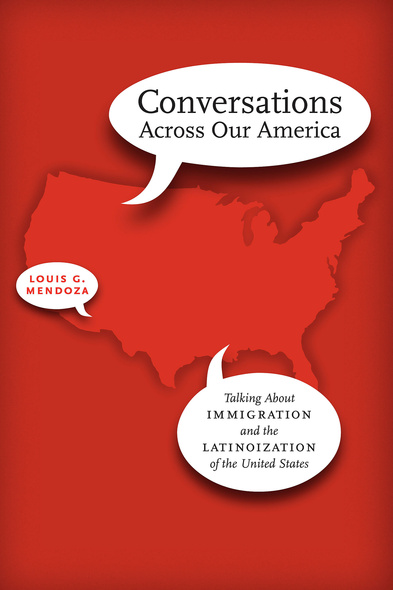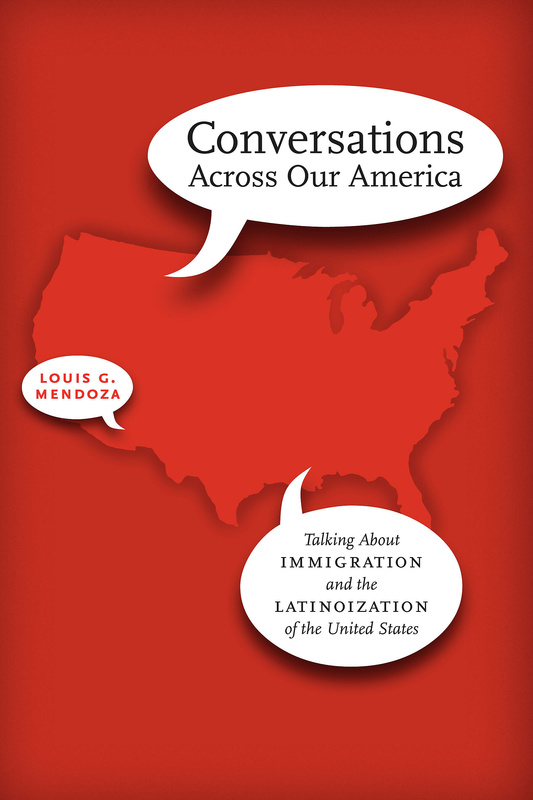Conversations Across Our America
Talking About Immigration and the Latinoization of the United States
In the summer of 2007, Louis G. Mendoza set off on a bicycle trip across the United States with the intention of conducting a series of interviews along the way. Wanting to move beyond the media’s limited portrayal of immigration as a conflict between newcomers and “citizens,” he began speaking with people from all walks of life about their views on Latino immigration. From the tremendous number of oral histories Mendoza amassed, the resulting collection offers conversations with forty-three different people who speak of how they came to be here and why they made the journey. They touch upon how Latino immigration is changing in this country, and how this country is being changed by Latinoization. Interviewees reflect upon the concerns and fears they’ve encountered about the transformation of the national culture, and they relate their own experiences of living and working as “other” in the United States.
Mendoza’s collection is unique in its vastness. His subjects are from big cities and small towns. They are male and female, young and old, affluent and impoverished. Many are political, striving to change the situation of Latina/os in this country, but others are “everyday people,” reflecting upon their lives in this country and on the lives they left behind. Mendoza’s inclusion of this broad swath of voices begins to reflect the diverse nature of Latino immigration in the United States today.
Louis G. Mendoza is Associate Vice Provost in the Office for Equity and Diversity at the University of Minnesota–Twin Cities, where he is also Chair and Associate Professor in the Department of Chicano Studies. He is coeditor of Crossing Into America: The New Literature of Immigration and author of Historia: The Literary Making of Chicana and Chicano History.
- Acknowledgments
- Introduction: The Latinoization of the U.S. and "Our" National Culture
- One. Leaving: Home Is No Longer Home
Gloria Caballero: Amherst, Massachussetts
Luis: Northeastern U.S.
Guillermo Vasa: New York, New York
Fernando: Boise, Idaho - Two. The Crucible of Change and Adaptation
Adela Marmion: Tucson, Arizona
Juan Marinez: East Lansing, Michigan
Guadalupe Quinn: Eugene, Oregon, CAUSA de Oregon
Victor Ochoa: San Diego, California
Magda Iriarte: Hickory, North Carolina
Alondra Espejel and Mariano Espinoza, St. Paul, Minnesota, Minnesota Immigrant Freedom Network - Three. An Emerging Sense of Mutuality
John Jensen: Melrose, Minnesota
John and Peggy Stokman: Melrose, Minnesota
Ángel Gnzález: Iowa City, Iowa
José Elizondo: West Liberty, Iowa - Four. Confronting Threats to Community
Raúl Raymundo: Chicago, Illinois, Resurrection Project
Rogelio Núñez: Harlingen, Texas, Proyecto Libertad
Yolanda Chávez Leyva: El Paso, Texas, University of Texas–El Paso
Cecilia Brennan: San Diego, California
Antonio Díaz, Oscar Grande, and Teresa Almaguer: San Francisco, California, People Organizing to Demand Environmental & Economic Rights (PODER) - Five. Asserting Rights
José Ramón Sánchez: New York, New York, Long Island University
Leticia Zavala: Dudley, North Carolina, Farm Labor Organizing Committee (FLOC)
Elizabeth García: Brownsville, Texas, Casa Digna
Briana Stone, Gabby Garcia, Paulina Baca, and Valerie Noce: El Paso, Texas, Paso del Norte Civil Rights Project
Mónica Hernández: San Ysidro, California, Casa Familiar
Enrique Morones: San Diego, California, Border Angels - Six. Internal Migration
Humberto Fuentes: Nampa, Idaho
Efrain and Francesca Marinez: East Lansing, Michigan
Dina Montes: New York, New York - Seven. Living in the Borderlands Means . . .
Jesse and Lupe Vega: El Paso, Texas
Carlos Marentes: El Paso, Texas, Centro de los Trabajadores Agrícolas Fronterizos
Verónica Carbajal: El Paso, Texas, Texas RioGrande Legal Aid
Ernesto Portillo: Tucson, Arizona, Arizona Daily Star
Manuel Velez: San Diego, California, San Diego Mesa College - Conclusion: Nuestra América Ahora: Meditations on Latinoization, Citizenship, and Belonging
- Notes
- Glossary
- Bibliography
- Index






